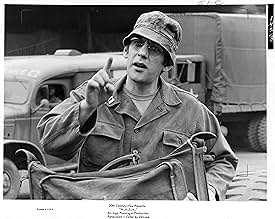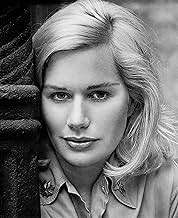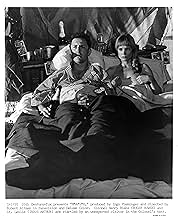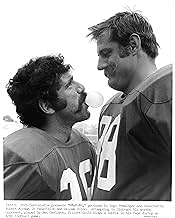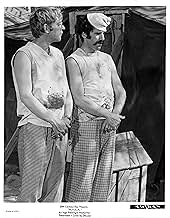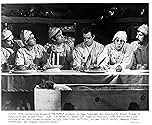O pessoal de um hospital de campo de guerra coreano usa o humor e a astúcia para manter a sanidade diante do horror da guerra.O pessoal de um hospital de campo de guerra coreano usa o humor e a astúcia para manter a sanidade diante do horror da guerra.O pessoal de um hospital de campo de guerra coreano usa o humor e a astúcia para manter a sanidade diante do horror da guerra.
- Direção
- Roteiristas
- Artistas
- Ganhou 1 Oscar
- 15 vitórias e 26 indicações no total
Timothy Brown
- Cpl. Judson
- (as Tim Brown)
- Direção
- Roteiristas
- Elenco e equipe completos
- Produção, bilheteria e muito mais no IMDbPro
Resumo
Reviewers say 'M*A*S*H' is a groundbreaking film blending black comedy with political satire, tackling war, religion, and societal norms. Praised for its innovative style and performances by Donald Sutherland and Elliott Gould, it's seen as a significant cultural artifact. However, some find its humor dated and characters unlikable. Its anti-war message and portrayal of gender and racial issues elicit mixed reactions, highlighting its complex legacy.
Avaliações em destaque
I should probably watch this again, since so many consider it a masterpiece. Maybe I was over-prepared (Hey, it took me a second viewing of 'Citizen Kane' to get my past pre-set expectations!). But while I could see why M*A*S*H was groundbreaking and important for a Hollywood film of it's day (lack of the usual clear narrative line, anti-war stance, overlapping, improvised dialogue, sexuality, bloody operating room scenes serving as ironic counterpart, etc), it felt pretty dated and unfocused. There are some very funny moments, but a lot of the ironies seem easy, and there's a lack of a true darker underpinnings and ideas, unlike, say, 'Dr. Strangelove'.
A lot of the humor is juvenile, cruel and silly. And while I get that's the point – nothing can be more deeply juvenile, cruel and silly than war, it got repetitive and heavy handed after a while. The performances are good, but beyond Robert Duvall, none of the characters have much in the way of dimensions. People stay exactly what we think they are from the moment we meet them.
Walter Chow makes a good argument on the web site 'Film Freak Central', that the sexism, homophobia, etc are the whole point. Altman is saying we're ALL beasts at heart, even if we act like we're bucking the system. It's an interesting idea, but I'm not sure I buy it's what Altman was intending.
A lot of the humor is juvenile, cruel and silly. And while I get that's the point – nothing can be more deeply juvenile, cruel and silly than war, it got repetitive and heavy handed after a while. The performances are good, but beyond Robert Duvall, none of the characters have much in the way of dimensions. People stay exactly what we think they are from the moment we meet them.
Walter Chow makes a good argument on the web site 'Film Freak Central', that the sexism, homophobia, etc are the whole point. Altman is saying we're ALL beasts at heart, even if we act like we're bucking the system. It's an interesting idea, but I'm not sure I buy it's what Altman was intending.
The only issue I can see with what's an amazing movie, is that we watching it now are aware of the TV series. That wasn't the case when the movie was released in 1970...two years before MASH the TV show.
The two have a few things in common; Korea, some of the characters names, the theme song, and Gary Burghoff as Radar.
The movie, it isn't anti-war, a reaction to the Vietnam War. Based on the novel written by Richard Hooker, it's a dark look on life inside a Mobile Army Surgical Hospital during that war, and how those drafted into that war dealt with the horrors of trying to piece together broken and torn bodies under those conditions.
I had watched it years ago, and I read the book before then, and yes a fan of the program. And I'm still a fan of the movie. Donald Sutherland as Hawkeye, Elliot Gould as Trapper John.were a perfect paring, and the rest of the casting was inspired, and the story moves along with out any lags, and ends much like it ends (no spoilers.) I judge movies by whether I'd see myself watching it yet again. That's the case with MASH and a visit to the 4077.
The two have a few things in common; Korea, some of the characters names, the theme song, and Gary Burghoff as Radar.
The movie, it isn't anti-war, a reaction to the Vietnam War. Based on the novel written by Richard Hooker, it's a dark look on life inside a Mobile Army Surgical Hospital during that war, and how those drafted into that war dealt with the horrors of trying to piece together broken and torn bodies under those conditions.
I had watched it years ago, and I read the book before then, and yes a fan of the program. And I'm still a fan of the movie. Donald Sutherland as Hawkeye, Elliot Gould as Trapper John.were a perfect paring, and the rest of the casting was inspired, and the story moves along with out any lags, and ends much like it ends (no spoilers.) I judge movies by whether I'd see myself watching it yet again. That's the case with MASH and a visit to the 4077.
This is truly the best military comedy ever made. It is funny, yet it realistically depicts the savagery of war and the non-chalance it gradually inspires in its victims. For example, some of the funniest, yet also most disturbing, moments in the film come when the doctors are operating on wounded soldiers, complete with gruesome sound effects, yet are discussing extremely trivial matters.
The film also benefits from some great performances. Donald Sutherland and Elliot Gould were excellent as Hawkeye and Trapper John. They both had a streak of good movies during the 70s. Robert Duvall is amusing as a pious major whose fanaticism drives our heroes to extreme measures. Sally Kellerman and Tom Skerrit also put in good performances in their roles; it is a pity that these two actors are not better utilized nowadays.
The film also benefits from some great performances. Donald Sutherland and Elliot Gould were excellent as Hawkeye and Trapper John. They both had a streak of good movies during the 70s. Robert Duvall is amusing as a pious major whose fanaticism drives our heroes to extreme measures. Sally Kellerman and Tom Skerrit also put in good performances in their roles; it is a pity that these two actors are not better utilized nowadays.
"MASH" broke barriers and defied conventions when it was first released in 1970. It still does today.
The pendulum has swung back a lot since 1970, and for that you still get a sense of the pioneering spirit with which the film was made. The overlapping dialogue. The non-linear, character-driven plot. The caustic humor. The attacks on religion (real religion, as the New York Times noted when the film came out, not false sanctimony but actual belief in God.)
Yes, in those ways the film is as powerful now as it was when it was first released. But you see something else, something audiences didn't see in 1970, so blown away were they by the newness of it. That is the picture runs out of gas halfway through.
You have a powerful beginning, that eerie montage with the strange song "Suicide Is Painless" playing mournfully while doctors, nurses, and orderlies silently rush to relieve choppers of their human cargo. It's quietly effective, immediately giving you a sense of the 4077th MASH unit (looking much bigger and grimmer than it ever did in the TV series) and coming as close as the movie ever does to delivering an effective anti-war statement. The movie builds from there as we meet the various characters, beneficiaries of their actors' strong improvisational work. It feels like real-time eavesdropping on a community of actual human beings. Scenes like Major Burns and Hot Lips' transmitted tryst and Painless Pole's suicide attempt are not as funny as we are meant to think, but they are well shot, especially the Painless Pole bit, the best thing in the movie for pure entertainment. The way all the guys in the Swamp crack up when Painless tells them he's decided to kill himself may be the film's funniest moment.
What happens next feels like a wrong turn. Hot Lips becomes the subject of a camp bet that exposes her to massive humiliation. Call it "indecent" or "politically incorrect," it is just plain wrong, exposing the film's (and its director's) nasty streak toward women and alienating any concern you might have built up for the characters. When she and Burns were targeted before, you had a sense they had it coming because of her overbearing military approach and his blaming orderly Boone for killing a patient. This time, she's a spent force, no threat to anyone, and "a damn good nurse," as Trapper says, just doing her job as best she can despite her earlier bad experience. I'm struck dumb at the idea I'm supposed to be laughing when she rushes into Col. Blake's tent in shock and tears.
The film never recovers. Instead, it veers wildly off course, away from the camp and into two radically pointless subplots, one involving a trip by Hawkeye and Trapper to Japan where they operate on a congressman's son and a sick infant (some sort of parallel there, though lost on me), the other a football game that apparently was director Robert Altman's comment on the folly of war, but to me just shows what happens when you allow your characters to veer off-script for so long you can't make it back to the ending as written. The game takes up too much time, throws in goofy circus music complete with slide whistles, and features the once iron-willed Hot Lips in the role of outlandishly enthusiastic cheerleader for all the people who tormented her so viciously for the duration of the film. Sally Kellerman's performance in the second half of the film is nothing like it was in the first half; it's embarrassingly, cartoonishly bad. Altman should have reined her in, but you get the feeling he was just rushing by then to get it all in the can before the studio figured out what he was up to and took his film away.
Altman was just so much better making "Nashville." Obviously he learned a lot. It's amazing how pasty everyone in this film looks, particularly Donald Sutherland, who seems leprous. No wonder he tried to get Altman fired. So much of the supporting players faded away, and though they do good work, it's not a surprise. They all seem so squalid and ugly as Altman shoots them.
It's interesting comparing the characters here to their counterparts in the TV series. For me, the TV characters are usually preferable. Robert Duvall mines zero comedy from Frank Burns, playing him very seriously in comparison to Larry Linville's more likeably miserable TV Burns. Roger Bowen had a great voice, but is nearly robotic as Blake, having none of McLean Stevenson's panache. What's worse than a pompous moralizing Hawkeye with Groucho affectations? How about that annoying whistle! Even Gary Burghoff, the one real holdover from film to series, plays a nastier Radar in the movie, meaner, tougher, less innocent.
The whole film is mean, tough, less innocent. It gets points from me for that. Altman and his cast develop a magnificent mood right away. But they fail to do very much with it. "MASH" is a great 45-minute-long movie that just goes on too long.
The pendulum has swung back a lot since 1970, and for that you still get a sense of the pioneering spirit with which the film was made. The overlapping dialogue. The non-linear, character-driven plot. The caustic humor. The attacks on religion (real religion, as the New York Times noted when the film came out, not false sanctimony but actual belief in God.)
Yes, in those ways the film is as powerful now as it was when it was first released. But you see something else, something audiences didn't see in 1970, so blown away were they by the newness of it. That is the picture runs out of gas halfway through.
You have a powerful beginning, that eerie montage with the strange song "Suicide Is Painless" playing mournfully while doctors, nurses, and orderlies silently rush to relieve choppers of their human cargo. It's quietly effective, immediately giving you a sense of the 4077th MASH unit (looking much bigger and grimmer than it ever did in the TV series) and coming as close as the movie ever does to delivering an effective anti-war statement. The movie builds from there as we meet the various characters, beneficiaries of their actors' strong improvisational work. It feels like real-time eavesdropping on a community of actual human beings. Scenes like Major Burns and Hot Lips' transmitted tryst and Painless Pole's suicide attempt are not as funny as we are meant to think, but they are well shot, especially the Painless Pole bit, the best thing in the movie for pure entertainment. The way all the guys in the Swamp crack up when Painless tells them he's decided to kill himself may be the film's funniest moment.
What happens next feels like a wrong turn. Hot Lips becomes the subject of a camp bet that exposes her to massive humiliation. Call it "indecent" or "politically incorrect," it is just plain wrong, exposing the film's (and its director's) nasty streak toward women and alienating any concern you might have built up for the characters. When she and Burns were targeted before, you had a sense they had it coming because of her overbearing military approach and his blaming orderly Boone for killing a patient. This time, she's a spent force, no threat to anyone, and "a damn good nurse," as Trapper says, just doing her job as best she can despite her earlier bad experience. I'm struck dumb at the idea I'm supposed to be laughing when she rushes into Col. Blake's tent in shock and tears.
The film never recovers. Instead, it veers wildly off course, away from the camp and into two radically pointless subplots, one involving a trip by Hawkeye and Trapper to Japan where they operate on a congressman's son and a sick infant (some sort of parallel there, though lost on me), the other a football game that apparently was director Robert Altman's comment on the folly of war, but to me just shows what happens when you allow your characters to veer off-script for so long you can't make it back to the ending as written. The game takes up too much time, throws in goofy circus music complete with slide whistles, and features the once iron-willed Hot Lips in the role of outlandishly enthusiastic cheerleader for all the people who tormented her so viciously for the duration of the film. Sally Kellerman's performance in the second half of the film is nothing like it was in the first half; it's embarrassingly, cartoonishly bad. Altman should have reined her in, but you get the feeling he was just rushing by then to get it all in the can before the studio figured out what he was up to and took his film away.
Altman was just so much better making "Nashville." Obviously he learned a lot. It's amazing how pasty everyone in this film looks, particularly Donald Sutherland, who seems leprous. No wonder he tried to get Altman fired. So much of the supporting players faded away, and though they do good work, it's not a surprise. They all seem so squalid and ugly as Altman shoots them.
It's interesting comparing the characters here to their counterparts in the TV series. For me, the TV characters are usually preferable. Robert Duvall mines zero comedy from Frank Burns, playing him very seriously in comparison to Larry Linville's more likeably miserable TV Burns. Roger Bowen had a great voice, but is nearly robotic as Blake, having none of McLean Stevenson's panache. What's worse than a pompous moralizing Hawkeye with Groucho affectations? How about that annoying whistle! Even Gary Burghoff, the one real holdover from film to series, plays a nastier Radar in the movie, meaner, tougher, less innocent.
The whole film is mean, tough, less innocent. It gets points from me for that. Altman and his cast develop a magnificent mood right away. But they fail to do very much with it. "MASH" is a great 45-minute-long movie that just goes on too long.
And then there was Korea. In an understaffed and overstretched medical camp Lt Col Blake puts an order in for more surgeons. Dispatched to him in a stolen army jeep are Captain's Hawkeye Pierce and Duke Forrest who immediately start chasing the nursing staff and annoying their tent mate Major Burns. When chest cutter Trapper John McIntyre joins them in the camp it starts a working practice that ignores authority and tries to find as much fun as possible in the middle of their bloody war.
I had watched the TV show for a long time before I finally got to watch the movie - I prefer the cynical comedy of the film although I have always loved the more sitcom style approach of the series. Many critics have hailed this as an anti-war film that exposes the brutal effects of war; to some extent I suppose that is true but it is far from being a part of the main narrative - even to call it a theme would be generous! It does have some scenes of blood and gore but it is far from having anything substantial to say about the cruelty of war.
Instead I always find this film to be a very episodic, freewheeling comedy, some bits of which work and some others don't. On the whole it is pretty funny and uses the sort of sporadic dialogue and action to move it forward. At times it is based on imaginative banter between Trapper and Hawkeye and at others it is out and out slapstick such as the chaotic game of American football at the end of the film. The downside of this is that sections of it just don't work - Painless Paul's dilemma is pretty uninspiring at least - however, on the whole it is energetic and very funny. Altman's use of overlapping dialogue and his usual use of overlapping scenes as opposed to a traditional narrative flow is good here but it would have been better if it had been toned down somewhat.
The cast is what really carries the film - the plot is weak and they have no characters other than what they create themselves and, although the dialogue is good, I couldn't help the feeling that the cast did as much as the writers. As such the lead two of Sutherland and Gould stand out as great comedians with great witty touches, their characters are the largest and their lines are the funniest. Skerritt starts out as equal to them but quickly becomes a third wheel despite still giving a good performance. The support cast are all a good mix of characters whether they be played by actors such as Duvall and Kellerman or less well known faces such as Burghoff or Bowen.
Overall, I am still unable to see what those who call this a `brutal anti-war film' see but that doesn't mean I can't enjoy it as a comedy. As such though, it is very episodic and really lacks a solid narrative flow meaning that any 10 minute period could be good or bad. Aside from this lack of substance it is a funny, enjoyable comedy but it doesn't deserve the classic reputation that it has obtained.
I had watched the TV show for a long time before I finally got to watch the movie - I prefer the cynical comedy of the film although I have always loved the more sitcom style approach of the series. Many critics have hailed this as an anti-war film that exposes the brutal effects of war; to some extent I suppose that is true but it is far from being a part of the main narrative - even to call it a theme would be generous! It does have some scenes of blood and gore but it is far from having anything substantial to say about the cruelty of war.
Instead I always find this film to be a very episodic, freewheeling comedy, some bits of which work and some others don't. On the whole it is pretty funny and uses the sort of sporadic dialogue and action to move it forward. At times it is based on imaginative banter between Trapper and Hawkeye and at others it is out and out slapstick such as the chaotic game of American football at the end of the film. The downside of this is that sections of it just don't work - Painless Paul's dilemma is pretty uninspiring at least - however, on the whole it is energetic and very funny. Altman's use of overlapping dialogue and his usual use of overlapping scenes as opposed to a traditional narrative flow is good here but it would have been better if it had been toned down somewhat.
The cast is what really carries the film - the plot is weak and they have no characters other than what they create themselves and, although the dialogue is good, I couldn't help the feeling that the cast did as much as the writers. As such the lead two of Sutherland and Gould stand out as great comedians with great witty touches, their characters are the largest and their lines are the funniest. Skerritt starts out as equal to them but quickly becomes a third wheel despite still giving a good performance. The support cast are all a good mix of characters whether they be played by actors such as Duvall and Kellerman or less well known faces such as Burghoff or Bowen.
Overall, I am still unable to see what those who call this a `brutal anti-war film' see but that doesn't mean I can't enjoy it as a comedy. As such though, it is very episodic and really lacks a solid narrative flow meaning that any 10 minute period could be good or bad. Aside from this lack of substance it is a funny, enjoyable comedy but it doesn't deserve the classic reputation that it has obtained.
Você sabia?
- CuriosidadesThe fourteen-year-old son of director Robert Altman, Mike Altman, wrote the lyrics to the theme song "Suicide is Painless." Because of its inclusion in the subsequent television series, he continued to get residuals throughout its run and syndication. His father was paid $75,000 for directing, but his son eventually made about $2 million in song royalties, with payments continuing, from first syndication through the present day, as M*A*S*H (1972) continues in syndication around the world.
- Erros de gravaçãoThroughout the film the characters are drinking the present 1970s style cans of Pabst Blue Ribbon and Budweiser. In fact, during the Korean Conflict, Pabst was not available overseas.
- Cenas durante ou pós-créditosThe shot of Hot Lips being revealed in the shower was replaced with her exiting the helicopter in network and basic cable showings when Sally Kellerman's name was announced.
- Versões alternativasSome of the scenes that were altered in the US "PG" version:
- The arterial spurting from the neck of a patient in the operating room was removed.
- When O'Houlihan is surprised in the shower, the tent flap begins to rise but the scene cuts away before seeing her.
- The "F-word" was removed from the football game.
- ConexõesEdited into Give Me Your Answer True (1987)
- Trilhas sonorasSuicide Is Painless
(1970)
Music by Johnny Mandel
Lyrics by Mike Altman
Sung by an The Ron Hicklin SIngers during the opening credits
Also sung by Ken Prymus (uncredited) during the last supper scene
Principais escolhas
Faça login para avaliar e ver a lista de recomendações personalizadas
Detalhes
Bilheteria
- Orçamento
- US$ 3.500.000 (estimativa)
- Faturamento bruto nos EUA e Canadá
- US$ 81.600.000
- Faturamento bruto mundial
- US$ 81.600.904
- Tempo de duração
- 1 h 56 min(116 min)
- Cor
- Proporção
- 2.35 : 1
Contribua para esta página
Sugerir uma alteração ou adicionar conteúdo ausente


